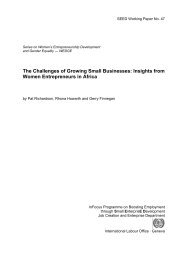manual: women workers' rights and gender equality - International ...
manual: women workers' rights and gender equality - International ...
manual: women workers' rights and gender equality - International ...
You also want an ePaper? Increase the reach of your titles
YUMPU automatically turns print PDFs into web optimized ePapers that Google loves.
HIV/AIDS at work<br />
HIV/AIDS is a workplace issue because:<br />
• there are 23 million infected workers aged 15 to 49 years in the world<br />
• this has a great impact on the workforce <strong>and</strong> enterprises<br />
• it has an impact on fundamental <strong>rights</strong> at work<br />
• the workplace can help to limit the spread <strong>and</strong> mitigate the impact of the epidemic<br />
The ILO has developed a Code of Practice on HIV/AIDS at Work in 2001. All member States of the<br />
ILO, including Cambodia endorsed this Code of Practice (for the full Code of Practice: see<br />
www.ilo.org/aids). The objective of the Code of Practice is to provide guidelines for governments,<br />
employers <strong>and</strong> workers to help them develop concrete responses to HIV/AIDS at the enterprise,<br />
community <strong>and</strong> national levels.<br />
There are 10 key principles mentioned in this Code:<br />
1. HIV/AIDS is a workplace issue: it affects the workforce <strong>and</strong> the workplace has a role to play<br />
in the struggle against AIDS<br />
2. Non-discrimination: there should be no discrimination against workers who are infected<br />
3. Gender Equality: <strong>women</strong> are more likely to be infected due to biological, socio-cultural <strong>and</strong><br />
economic reasons. Therefore, more equal <strong>gender</strong> relations <strong>and</strong> empowerment of <strong>women</strong> are<br />
vital to successfully prevent the spread of HIV infection.<br />
4. Healthy Work Environment: is necessary to prevent transmission of HIV<br />
5. Social Dialogue: there should be co-operation <strong>and</strong> trust between employers, workers <strong>and</strong><br />
government to address this problem<br />
6. No Screening: HIV/AIDS screening should not be required of job applicants or persons in<br />
employment<br />
7. Confidentiality: personal data related to HIV status should be bound to the rules of<br />
confidentiality<br />
8. Continuation of employment relationship: persons with HIV-related illnesses should be<br />
enabled to work as long as they are medically fit in available, appropriate work<br />
9. Prevention: all possible measures should be taken at the workplace to prevent HIV infections:<br />
behaviour, knowledge, treatment <strong>and</strong> creation of a non-discriminatory environment<br />
10. Care <strong>and</strong> Support: all workers, including workers with HIV, are entitled to affordable health<br />
services<br />
Related sessions <strong>and</strong> briefing notes<br />
4.20 Occupational Safety <strong>and</strong> Health<br />
Briefing Note 8 Health Rights <strong>and</strong> Work<br />
Briefing note 9 Violation of Rights at Work: File a Complaint<br />
129

















